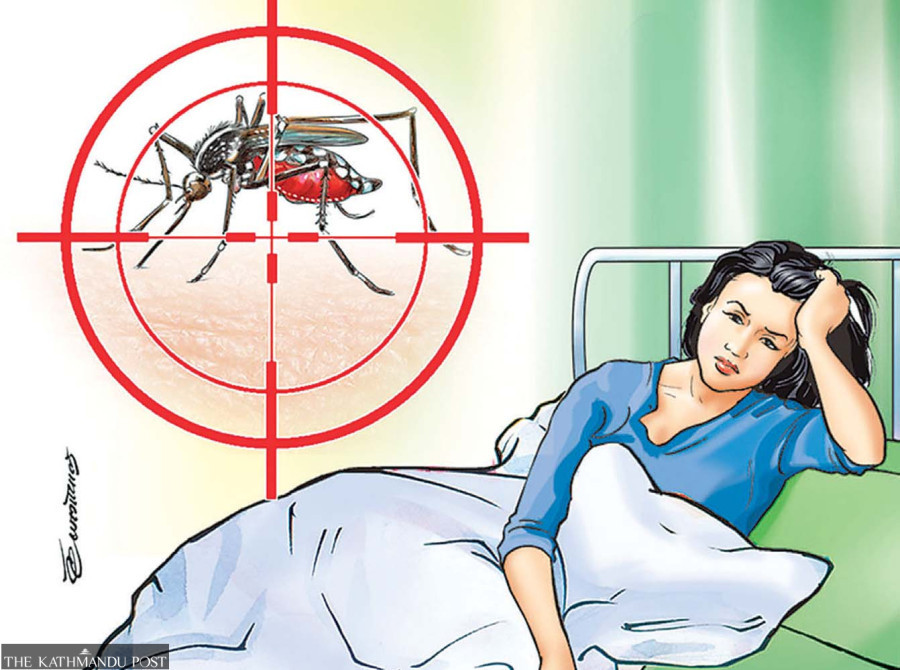Health
Dengue virus kills one in Kathmandu
A 24-year-old woman from Kathmandu, admitted to Sukraraj Tropical and Infectious Disease Hospital, succumbed to the disease on Wednesday.
Arjun Poudel
At least one person died from the infection of the dengue virus in Kathmandu, which is probably the first death from the deadly disease this year.
According to officials at the Epidemiology and Disease Control Division (EDCD), a 24-year-old woman admitted to the Sukraraj Tropical and Infectious Disease Hospital, Teku for treatment died on Wednesday.
“The woman had a seizure also,” said Dr Chandra Bhal Jha, director at the division. “We didn’t find other health issues in the deceased. We will declare a dengue death in today’s data update.”
The Sukraraj Hospital administration had also informed the division about the death from the dengue virus on Wednesday.
Health officials are often accused of suppressing data on dengue deaths, fearing public backlash for failing to control the spread of the deadly virus.
Dr Prakash Budhathoki, spokesperson for the Ministry of Health and Population, said that he has issued clear instructions to the EDCD officials not to declare deaths from dengue virus infection without a detailed investigation.
“I have directed EDCD officials to investigate the death and inquire with doctors attending the victims first, and only confirm the cause of the deaths,” said Budhathoki. “We won’t say death from dengue if the patient also had diabetes.”
He acknowledged that he was informed about the death from the dengue virus in Kathmandu and has directed officials to deploy a team to verify.
Dengue is a viral disease transmitted by female Aedes aegypti and Aedes albopictus mosquitoes. According to the World Health Organisation, the same vector also transmits chikungunya, yellow fever, and the Zika virus.
As many as 2,984 people have been infected with the dengue virus since January, which has been spread in 74 districts across the country.
The number of people infected with the virus in the past one week reached 168, and the reported cases could be just the tip of the iceberg, as 90 percent of the cases remain asymptomatic, according to doctors.
Many people infected with dengue show mild symptoms, which do not need any treatment or can be managed with paracetamol at home.
In 2024, 15 people died, and 41,865 others were infected as the virus spread to 76 districts. In 2023, 88 persons succumbed and more than 54,000 were infected by the virus, which had spread to 77 districts.
At the time, hospitals in Kathmandu Valley were overwhelmed with dengue patients, and pharmacies had run out of paracetamol, the most widely used medicine to treat fever.
It has been years since dengue became endemic, meaning people get infected throughout the year, health officials no longer classify it as an outbreak of a deadly virus.
The Ministry of Health and Population declared a month-long campaign against dengue virus on July 17. Officials hope that the campaign will be owned by all agencies concerned and local units throughout the country and that activities will be carried out accordingly.
The health ministry in July estimated that in a worst-case scenario, up to 60,000 people across the country could get infected with the dengue virus this year.
Entomologists say that, along with launching a search-and-destroy drive on a regular basis, authorities should also focus on a multisectoral approach, community engagement, door-to-door campaign, and strengthening the capacity of health facilities to handle possible outbreaks.
Experts also suggest regular monitoring of construction sectors, houses and offices to check if larvae of dengue mosquitoes are thriving in such places.
Dengue-transmitting mosquitoes breed in clean water and bite people in daylight. Uncovered water tanks and discarded objects such as plastic cups and bottles could be breeding grounds for dengue-carrying mosquitoes.
According to doctors, symptoms of dengue include mild to high fever, severe muscle pain, rashes, acute headache and pain behind the eyes. Doctors advise those with these symptoms to seek immediate treatment. While there is no specific cure for the disease, early detection and access to proper medical care can lower fatalities.
Nepal reported its first dengue case in a foreigner in 2004 in Chitwan district. Since then, an increasing number of dengue infections, including major outbreaks, have been reported from many districts.
The World Health Organisation says there is no specific cure for severe dengue, but early detection and access to proper medical care can save lives.




 25.96°C Kathmandu
25.96°C Kathmandu















